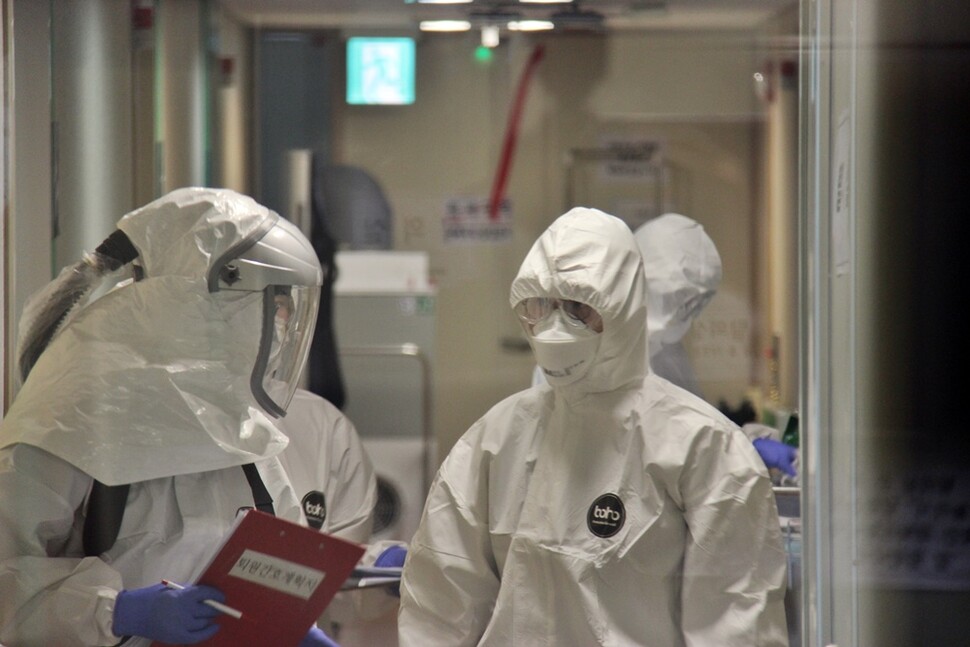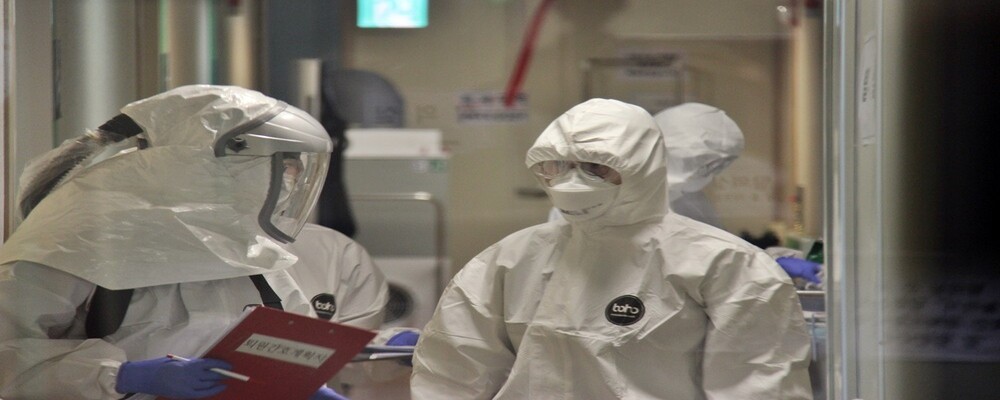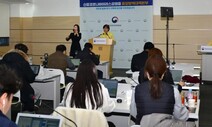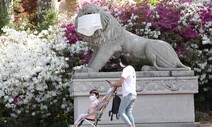
4월27일 대구의료원 의료진이 대구에서 맨 처음 코로나19 확진 판정을 받았던 환자의 퇴원을 논의하고 있다. 대구의료원 제공
‘같은 바이러스, 다른 대응’. 인간이 거주하는 땅덩어리 대부분은 코로나19에 의해 점령됐다. 하지만 이 사태에 맞서는 각 나라의 대응은 같지 않다. 사태를 바라보는 시각도 다르다. 여기 코로나19를 바라보는 세 개의 시선을 소개한다. 11개 나라에 흩어져 사는 교민들에게 편지를 받았다. 같은 재난에 맞선 각 나라의 다른 대응을 들어본다. 국내에서 활동하는 외신기자 3명이 한국의 코로나 대응을 외부자의 눈으로 분석한 글을 보내왔고, 국내 코로나 최고 전문가 5명이 내부자의 시선으로 냉철하게 이야기를 주고받은 좌담을 정리했다_편집자주
10대 후반, 아니면 20대 초반의 여성임이 분명했다. 어머니 무릎을 베고 누운 채 고열에 시달리고 있었다. 대구의료원에 신설된 코로나19 전담 병동에서 수십 명과 함께 진단검사를 기다리는 모녀의 얼굴엔 걱정스러운 표정이 역력했다. 2020년 2월21일 금요일이었다. 불과 이틀 전인 19일 신천지교회에서 집단 발병이 확인됐고, 그때부터 사태는 급속히 나빠졌다. 확진자가 30명에서 200명 이상으로 급증했는데, 대부분 대구와 그 주변 지역에서 발생했다. 한국에서 첫 사망자도 그날 새벽에 나왔다.
택시기사부터 공무원까지 책임감 넘쳐
많은 감염병을 겪으며 살아가고 메르스와 사스가 유행할 때의 생생한 기억을 가진 한국 같은 나라에서도 코로나19는 전혀 새로운 문제라는 걸 뜻했다. 그날 아침 대구에 발을 디딘 순간 그걸 느낄 수 있었다. 그래도 다른 나라에서와 같은 공황 사태는 없었다. 택시기사부터 의사, 가게 주인, 공무원까지 모든 사람이 뭔가 엄청난 성실함과 책임감을 보여주는 모습이 인상적이었다.
물론 앞으로 닥칠 일에 대한 전반적인 불안감, 걱정스러운 불확실성이 감돌았다. 진단검사를 기다리는 동안 줄곧 젊은 딸의 머리를 어루만질 게 분명한 그 어머니가 명백한 사례처럼 보였다. 돌아보면, 우리는 그때만 해도 코로나19를 거의 알지 못했다. 석 달 이상 지난 지금도 우리는 이 끔찍한 바이러스로부터 배워야 할 게 너무나 많다.
내 뇌리를 가장 강하게 스친 건 절반쯤 비어버린 대구 거리도, 곳곳에 놓인 손소독제도, 둔중한 보호장구를 착용한 의료진도 아니었다. 바로 그 모녀의 모습이었다. 나는 그 모습이 꼭 3주 전 중국 우한에서 촬영된 가슴 아픈 한 장면을 연상시킨다는 걸 곧바로 깨달았다. 코로나19로 숨진 어머니에게 제대로 작별 인사도 하지 못한 채 혈육의 주검을 병원에서 화장장으로 옮기는 구급차를 쫓아가며 계속 “엄마, 엄마”를 외치던 한 여성….
그 장면은 눈앞의 ‘보이지 않는 무대 장벽’이 허물어지는 순간이었다. 말하자면, 그 순간 코로나19 뉴스는 내게 더는 연극 무대의 뒤쪽, 이웃 나라, 다른 사람들에게 일어나는 이야기가 아니었다. 그렇게 사적인 순간을 언론인은 카메라에 계속 담았고, 그 덕분에 현장에 있지 않았던 나 같은 사람들도 주로 ‘얼굴 없는 숫자’(확진, 치료, 사망 등)로만 전해지던 상황에 깊이 공감하게 됐다. 그 장면은 코로나19가 사랑하는 사람과 이별할 기회조차 박탈할 만큼 엄청나게 잔인할 수 있다는 걸 보여주었다.
대구의 그 모녀를 보면서 나는 곧바로 이 모든 게 다시 생각났다. 나아가 코로나19가 얼마나 감염성이 높은지, 그리고 이것이 우리 가족과 친구, 동료와 이웃, 동네와 국가까지 위협하는 진정한 국제적 위협이라는 것도 새삼 확인했다.
대구에서 서울로 돌아오자 한국 정부는 내가 대구를 방문했을 때와 똑같이 식료품이나 의약품 구매가 아닌 경우 일정 기간 자가격리 지침을 엄수하도록 권고했다. 그 14일 동안, 나는 코로나19 사태와 그 거대한 시사점을 성찰할 시간을 가졌을 뿐 아니라, 한국(국민과 정부)의 놀라운 대응을 지켜볼 수 있었다.
대구에서 내 경험과 한국의 코로나19 대응에 대한 내 보도가 스페인에 있는 내 부모님과 면역력이 약한 내 동생의 목숨을 구했을 수도 있다. 내 보도가 “사람들을 겁주려는 게” 아님을, 그리고 대다수 주변 사람이 여전히 상황을 가볍게 여기고 있음에도, 향후 몇 주 동안 모두가 집에 머물러 있어야 한다는 것을 사람들이 깨닫게 하려면 스카이프(영상통화 앱)로 아주 고역스러운 주장을 펼쳐야 했다.
한국의 3T 시스템 보도할 수 있어 행운
대부분 국가가 코로나19에 암담해하던 시기에 내가 한국에서 적용된 3T(Trace, Test, Treat), 즉 ‘추적, 검사, 치료’ 시스템을 이토록 자세히 보도할 수 있었던 것도 정말 행운이다. 2월만 해도 트위터 같은 소셜미디어에서 많은 사람이, 심지어 스페인에 있는 내 친구들조차 코로나19 확산이나 사회적 거리 두기의 필요성에 대한 반응이 ‘무관심’이었다는 건 역설적이다. 당시만 해도 그들에게 코로나19는 여전히 “다른 나라의 다른 사람들” 이야기였다.
그러나 3주가 지나자 세계의 모든 사람은 자신들의 나라와 경제를 완전히 봉쇄해버린 이 고약한 유기체에 한국이 어떻게 그렇게 잘 대응했는지 더 알기를 열망했다. 바로 그즈음, 그들 역시 우리가 어떻게 코로나19에 함께 맞서야 하는지 깨달았다.
스페인은 코로나19 최대 피해국 중 하나이며, 내 고향인 마드리드는 가장 많은 사망자가 나온 지역이다. 몇몇 가까운 친구가 부모와 친척을 잃었다. 강력한 폐쇄 조처가 10주나 이어진 지금에야 그곳 사람들은 일상에 근접하는 수준이나마 회복하기 시작할 것이다.
백신이나 치료제가 발견되기 전까지 산발적인 코로나19 발병이 일상화될 현실에 대응하려면 한국도 공유해야 할 경험이 많다. 나는 기자로서 그 모든 노하우를 전달하기 위해 최선을 다할 것이다.
나는 대구의 그 모녀도 다시 만나고 싶다. 이번에는 그들과 대화할 용기를 내려 한다. (나는 그들을 처음 봤을 때 중국 우한의 그 기자와 달리 촬영하지 않았다.) 그들이 어떻게 지내는지 묻고, 나의 한국인 기자 친구가 대구의료원에서 내가 목격한 장면 이야기를 듣고 영감을 받아 지은 아름다운 시를 보여주고 싶다. 그때엔 나와 그 모녀 세 사람은 지난 2월과 달리 더 편안한 마음일 거라고 확신한다. 또 적어도 지금 이 순간만큼은 우리가 이곳 한국에서 잘 지내는 것 같다는 믿음을 나누게 될 것이다.
안드레스 산체스 브라운 스페인 통신사 서울 특파원
※한겨레21 '코로나 뉴노멀' 통권1호를 e-북으로도 보실 수 있습니다.(클릭하시면 '알라딘' e-북 구매 링크로 연결됩니다)
She must've been in her late teens or early twenties. Lying on her mother's lap, burning with fever. A worried look on both their faces as they waited to get tested along with dozens of people at Daegu Medical Centre's newly establised COVID-19 wing. It was Friday February 21st 2020. The Shincheonji outbreak had just been identified 2 days prior and since then things had unfurled out pretty fast: infection cases had skyrocketed from only 30 to more than 200, most of them in and around Daegu, and the first person had just died in South Korea because of the virus.
Even in a country that has lived through many epidemics and holds fresh memories of ones such as MERS or SARS like Korea this meant a sudden new mindset, and I could feel that the moment I set foot on Daegu that morning. There wasn't any of the panic that we've seen in other places, though. From the taxi driver, to the medical officer, to the shopkeeper to the town official, they all showed, above all, some tremendous integrity and sense of duty that impressed me.
Of course, there was also a general sense of unease, of worried uncertainty, for what was coming, and that young woman and her mother, who would'nt stop caressing her daughter's hair while they waited, seemed to be the clearest example. We knew so little about COVID-19 back then... And still now, more than three months later, there's so much we still have to learn from this terrible virus...
All in all, it wasn't the semi empty streets of Daegu or the bottles of hand sanitizer placed at every corner or all those medical workers clad in protective gear. It was those the image of those two women that struck me the most. I soon realized it reminded me of some heartbreaking footage shot in Wuhan I had watched three weeks earlier. It showed a woman chasing an ambulance while crying "mom" repeatedly as her mother's body was being taken from the hospital to a crematorium without her being able to give a proper farewell.
That scene had brought down the "fourth wall" for me, so to speak: at that point the coronavirus news story stopped being something happening on the other side of a screen, at a neighboring land, to "other people". Despite being such an intimate moment, the journalist recording it kept his camera rolling and thanks to that people like me, who were'nt there, could really empathize with a situation that up until that moment seemed to be mainly about big faceless numbers (infected, cured, deceased etc). It showed how tremendously cruel this virus can be, depriving us of even the chance to say goodbye to our beloved ones.
Seeing both mother and daughter in Daegu immediately reminded me of all this and also certified how very real the high contagiousness rate of this virus was, making it a true global threat to our families, our friends, our collegues, our neighbours, our towns, our countries...
When I came back to Seoul, the Government recommended that I go into partial isolation, just leaving my home to buy food or meds, as I had visited Daegu. During those 14 days, not only did I have the time to reflect on the coronavirus and its huge implications but I was also able to witness Korea's -both its people and authorities- amazing response to it.
My experience in Daegu and my reporting about Korea's response to coronavirus might have actually saved my mom and dad's life back in Spain, and even my brother's, given how weak his immune system has always been. It took a very nasty Skype argument to finally make them realize that this wasn't the media "trying to scare people" and how they all neeeded to stay home for the coming weeks despite the fact that everybody around them was still taking the situation lightly.
I've also felt truly lucky for being able to report in such detail on the "Trace, Test and Treat" system applied in Korea at a time where most of the world felt in the dark regarding the virus.
It's ironical how in February the reaction of many people on social networks like Twitter, or even my close friends in Spain, was that of indifference when it came to talking about the spread of COVID-19 or the need to stay away from public places. To them it was still something that affected "other people in some other country".
But fast forward three weeks and everybody was eager to know more about how Korea had managed to respond so well to this mean organism which had been able to completely shut down their entire countries and economies. By that point, they too, had realized how we're all together in this.
Spain is one of the countries worst hit by COVID-19 and my hometown, Madrid, one of the regions with most deaths on its back. Some close friends have lost their parents and other relatives to the pandemic and now, after 10 weeks of intense lockdown, people there are going to start recovering something similar to normality. In coping with a reality where sporadic outbreaks will be the norm until a vaccine or cure is found, Korea too has much experience to share and I'll keep trying my best to convey all that know-how through my work as a reporter.
I'd also like to meet that mom and daughter from Daegu again, and this time muster the courage to talk to them (I unlike, that reporter in Wuhan, didn't keep my camera rolling). I'd ask how they're doing and I'd show them the beatiful poem my journalist friend Kang Hae-ryun was inspired to write after I told her about the scene I witnessed at Daegu Medical Center. I'm sure the three of us would be feeling more at ease now, unlike February, and we'd probably share the belief that, at least for now, it looks like we're in good hands here in Korea. END
2장_외신기자가 본 K-방역
1. 스페인 기자, 대구의료원에서 만난 모녀의 안부를 묻다
2. 일본기자가 말하는 K방역 성공의 비밀
3. 캐나다 기자, 전면 봉쇄없이 코로나 이겨내는 한국을 배우자
한겨레21 인기기사
한겨레 인기기사

미 국무부 “한국 사법 존중”…백악관 논란 메시지 하루 만에 ‘수습’

트럼프 “모든 방법 동원해 더 걷을 것”…‘전 세계 10% 관세’ 서명

원룸 살면서 평생 모은 5억…“누나, 나처럼 아픈 사람 위해 써줘”

미 대법, 트럼프 상호관세 위법 판결

몸에 피 한방울 없는 주검이 되어 돌아온 새 신랑

“대통령의 계엄 결정 존중돼야”…지귀연의 내란 판단, 어떻게 다른가

트럼프, ‘상호관세 위법’ 판결에 발끈…“전세계 10% 관세” 강행
![[사설] 한반도의 ‘대중 발진기지화’ 절대 용납 못 한다 [사설] 한반도의 ‘대중 발진기지화’ 절대 용납 못 한다](https://flexible.img.hani.co.kr/flexible/normal/500/300/imgdb/child/2026/0220/53_17715824682676_20260220502623.jpg)
[사설] 한반도의 ‘대중 발진기지화’ 절대 용납 못 한다

펄쩍 날아오른 김길리 ‘2관왕’…최민정은 통산 7개 메달 신기록

위증 혐의 최상목, ‘한덕수 중형’ 이진관 재판부 기피 신청





















